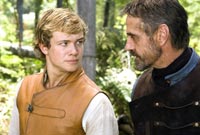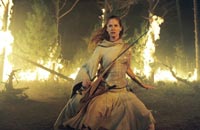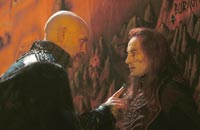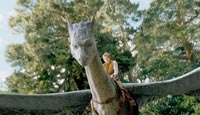When I was a teen, I decided to write a novel. Recently, I found some of that book. To my surprise, my book was practically a chapter-by-chapter rewrite of Douglas Adams’ The Hitchhiker’s Guide to The Galaxy. Impressionable and naïve, I had no idea how much I had absorbed from it and merely spit back onto the page.
I’m afraid that happened to author Christopher Paolini. I’ve never read his novel Eragon, which he wrote at 17. However, if the film version is any indication, Paolini’s tale shows his age—and that he must really like the original Star Wars film. Perhaps the book has more unique elements and compelling plot. But stripped down in this lifeless and forced screenplay by Jurassic Park III scribe Peter Buchman, all we get is the tale of Luke Skywalker—with a dragon instead of a lightsaber. And while the plot is Star Wars, the feel is of a poor man’s Lord of the Rings. Really, this is the story of a galaxy far far away … in Mordor.

Eragon (newcomer Edward Speleers) is a poor farm boy (no, not on a moisture farm) who’s been raised by his uncle (no, there’s no Aunt Beru) in a remote area of a land called Alagaesia (no, there aren’t two suns). When a beautiful rebel fighter Arya (no, she’s not a princess) gets captured by an evil emperor’s henchman (no, he’s not voiced by James Earl Jones), something Arya has stolen (no, it’s not Death Star plans) lands in Eragon’s hands (no, it’s not via droid). With the mentoring of a cantankerous aged warrior named Brom (no, he’s not played by Alec Guinness, but by Jeremy Irons), Eragon discovers he has a great destiny and ancient powers (no, they’re not Jedi mind tricks—oh wait, they kinda are). Along with a mysterious anti-hero who lends his fighting abilities (no, there’s no Wookiee), Eragon ventures to rescue the princess (I mean, Arya) and help her hidden rebel fighters bring peace back to the galaxy (I mean, to Alagaesia).

What sets Eragon apart from films like Star Wars, Lord of the Rings, Willow and Dragonheart (OK, not Dragonheart) is that Eragon’s destiny involves a mighty dragon. This farm boy is the last in the line of legendary Dragon Riders—honorable protectors of the peace (ya, that sounds like the Jedi). The Dragon Riders are now all but extinct because a bad seed hunted down his brethren (no, it’s not Eragon’s dad—I don’t think). Now, destiny has chosen Eragon as the new hope to strike back at the empire.
Destiny comes in the form of a young dragon who has waited in her egg until her Rider was ready. Now is the time. Saphira the dragon, voiced by Rachel Weisz, is a pretty impressive beast of computer wizardry. Her majestic presence and emotional blue eyes are wonderfully brought to life. Saphira, along with Irons’ Brom, give the film its few glimpse of true life. But you can’t help but feeling they are both underused. For instance, the playfulness of Saphira as an adorable dragon pup and the thrill of her in flight (and battle) are neat but rushed. And while the idea of a mystical bond between a rider and his dragon is intriguing, you are told about it more than you really see it.

Instead of being pulled into this world, we just observe characters with alphabet-soup names (that tend to use outcast letters like X and Z) walk around pretty places with long names while giving long, dry and unintentionally funny speeches about destiny, magic and grotesque demon-things coming to get them. Being kept at an arm’s length leaves a lot of questions. How exactly does this magic work? Why do the travelers walk and ride horseback everywhere when they have a big flying dragon? Why do only ugly creatures work for the evil guy? Why does the evil Galbatorix (a completely wasted John Malkovich) spend all his time brooding in a big decorative chair staring at a map of his kingdom? And where do evil rulers get their impressive chairs and big maps?
Sure, maybe these are just silly questions, but if I’m thinking about maps and chairs instead of Eragon’s seemingly epic story, something’s wrong. And it’s more than the film’s Star Wars similarities. After all, fantasies are rarely very unique. Star Wars was certainly not very original—or all that dynamically written. But truly captivating fantasies take classic archetypes and legends and add new dimensions to create worlds we’ve never seen before. They make us fall in love with characters. They invite us in. The create a sense of wonder.

While some pre-teens and younger teens will be pleased enough with the adventure, Eragon mostly fails at all these things. Thrills are few and far between. The long speeches of gobbledygook aren’t memorable, and the acting of lead Speleers is silly and consists almost entirely of opening his eyes really wide. Characters are wooden, two-dimensional and caricatured. This adventure just seems staged and sterile—not truly adventurous. There was a lot of scoffing, sighing and mocking in the audience when I saw the movie. And thematically, Eragon‘s weak messages are delivered primarily through clichéd sayings like “What someone is seeking is often right under his nose,” “It’s good to be brave, but better to be wise,” and “It’s better to ask forgiveness than permission.”
Another old cliché that can be attached to the film? Instead of seeing Eragon, go rent the better, more worthwhile films it emulates. Or read the book.
Talk About It
Discussion starters- When Eragon discovers that he’s chosen because of what’s in his heart, he mentions that his heart is not without fear. Do you think true heroes are really fearless? Is fear always negative? How can fear be a good thing? Another character says, “Without fear, you cannot have courage.” What does that mean to you
- How would you treat someone if you discovered their father was a known criminal? Would you be suspicious? Do they deserve to be punished as well? In the movie, a character says, “You can’t choose who your father is.” What do you think of that idea? Does a person’s family reputation say anything about who they really are
- What do you think about movies that use magic as a plot device? Read Deuteronomy 18:9-11. Is watching movie magic different than real-world magic? How? (Think also of movies like Harry Potter and Lord of the Rings.) In Eragon, are the supernatural powers used for good or for evil? Can you clearly tell good magic from bad magic? What rules or limits are placed on the magic of Eragon? Are there consequences from using it? What?
The Family Corner
For parents to considerEragon is rated PG for battle sequences and frightening moments. For PG, the movie is very violent and at times scary. A man sticks his pointy fingernail into a temple producing blood. There are many battles and sword fights. Magic and sorcery (mainly for evil) are depicted often. The hero also visits a fortuneteller who reads his future.
Photos © Copyright 20th Century Fox
Copyright © 2006 Christianity Today. Click for reprint information.
What Other Critics Are Saying
compiled by Jeffrey Overstreet from Film Forum, 12/21/06After years and years of forgettable, corny, poorly written fantasy movies, Peter Jackson’s Lord of the Rings films revealed just how powerful and profound that genre can be.
Now, Stefen Fangmeier’s version of Eragon, the best seller penned by 17-year-old Christopher Paolini, is reminding everyone of just how clichéd and ridiculous fantasy movies can be.
Critics are trying to keep a straight face while John Malkovich growls dialogue that nobody should ever be forced to speak aloud … not even a villain. (“I suffer without my stone.”)
Christopher Lyon (Plugged In) praises the animation, and then says, “It’s in the overwrought script, choppy editing, low-budget sets and clumsy plotting that Eragon fails to take off. For starters, large chunks of the book are sacrificed to the film’s 100-minute running time, leaving the final act, especially, vulnerable to a series of sudden character introductions and abrupt actions sequences. It’s unclear, though, that more minutes would make for a more watchable film.”
Harry Forbes (Catholic News Service) is a little more impressed. He calls it “a reasonably diverting, if predictable, fantasy adventure. … Peter Buchman’s script … trots out every cliché known to this genre, but to its credit, director Stefan Fangmeier’s film is well paced, and the special effects, especially those involving the dragon, are well done.”
“The movie is formulaic,” says Michael Brunk (Past the Popcorn), and he goes on to list all of the familiar elements. “Eragon is neither deep nor complex,” he concludes. “The plot is simple, the story uncomplicated. Good and evil are clearly delineated; there are no confusing shades of grey. For all that, I found myself enjoying this movie.”
Lisa Rice (Crosswalk) sounds as though she’s seen a different film. “Eragon is a thoroughly delightful, highly entertaining movie that is chock-full of spiritual allegories. … [This movie] should be the perfect escape this month for the family all fed up with Christmas stress and ready to fly and conquer with the dragons.”
Mainstream critics are shooting this dragon down.












